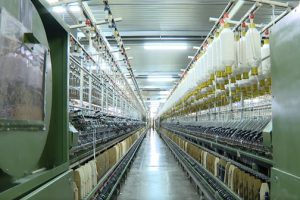
There is widespread agreement that the effectuation of the macroeconomic reforms has jump-started flexing its wings in a winning manner and resolving major predicaments revolving around foreign exchange with success.
As things stand at present, the federal government’s unflinching stance to resolve major challenges on gross national debt, inflation, foreign currency deficiency, and other related aspects has been moving forward in the right direction.
In the aftermath of the wide-ranging macroeconomic reform, multifaceted concrete results have been registered over and over again. At this moment in time, the country’s exchange rate has been moving forward in an appropriate manner more than ever before. If truth be told, the aforementioned reality in black and white demonstrates the positive moves of the reform in taking the country to the next level of accomplishment at the earliest possible juncture.
In actual fact, the implementation of the reform has been smoothing the path of the country’s foreign exchange reserves in a successful and triumphant fashion. This shows that the reform has been playing a part in catapulting the country’s economy to a whole new level and new horizons.
It is expected that the macroeconomic reform becomes involved in fashioning economic integration among the Horn of Africa and beyond.
The Ministry of Industry has recently stated that macroeconomic reforms implemented by the Ethiopian government since July have successfully addressed key bottlenecks in the manufacturing sector.
Industry State Minister, Hasan Muhumed Moalin, told ENA that the reforms have, for example, alleviated the long-standing foreign currency shortage that previously hindered manufacturers’ ability to import essential inputs, spare parts, and machinery.
It should be recalled that the ministry recently organized a public-private dialogue aimed at addressing challenges and seizing opportunities to unlock the potential of the manufacturing sector.
“We had a public-private dialogue focused on our economy, led by the private sector, which plays a crucial role,” Hasan said. “Therefore, it is important to understand the problems, challenges, and opportunities arising from the macroeconomic reforms. In this context, foreign exchange was a major constraint for the manufacturing sector, limiting the importation of spare parts, inputs, and machinery. However, the macroeconomic reform has completely resolved this issue.”
To support manufacturers, the government has addressed foreign currency constraints, improved access to finance and electricity, and prioritized financial services for the manufacturing sector, said the State Minister.
The government has also included the manufacturing sector in its national development plan, alongside other key sectors, recognizing its crucial role in domestic consumption, export growth, import substitution, and overall economic development.
The Ethiopian government has been providing policy support to the manufacturing sector, with Prime Minister Abiy Ahmed establishing a National Council led by Girma Biru.
This council brings together various stakeholders to address sector-specific challenges and seize opportunities. Regular discussions are held to resolve challenges and capitalize on potential opportunities.
As part of the efforts, manufacturers across Ethiopia have been identified, categorized by scale and sector, to better understand their capabilities and provide appropriate support.
The promising strides being registered in major segments of the country have been yielding results and pointing forward in the right direction tackling key logjams in various sectors. Other than that the macroeconomic reforms have been successfully addressing key bottlenecks. This being the case, Ethiopia has been going in the right direction.
As things stand at present, the country has jumpstarted ensuring a wide range of macroeconomic reform assisting the economic sector to become wide-ranging and competitive.
Prime Minister Abiy Ahmed announced in the recent past that Ethiopia has embarked on full implementation of macroeconomic reform policy, according to information obtained from a source.
In a macroeconomic reform program policy statement issued recently, Prime Minister Abiy elaborated that the government has been implementing numerous economic reforms to address longstanding structural problems, including debt burden, inflation, unemployment, and low productivity following the political change which ushered in 2018.
The first phase of the Home-Grown Economic Reform Program (HGER 1.0), introduced in 2019, included policy ideas from macro-financial to structural and sectorial, Abiy pointed out.
Through HGER 1.0, Ethiopia has achieved significant economic objectives, correcting imbalances, alleviating debt, and expanding growth sources, despite remaining reform areas.
Ethiopia has become one of the fastest-growing economies in the world, achieving an average GDP growth rate of 7.1% from 2019 to 2023, he said.
Consequently, the premier added that Ethiopia has become a significant player in the African economy and demonstrated commitment to the Sustainable Development Goals, building the largest economy in East Africa and the third-largest in sub-Saharan Africa.
The policy statement detailed the key pillars of the Homegrown Economic Reform Program (HGER 2.0), the second phase of the country’s economic transformation efforts including establishing a modern macroeconomic policy framework to ensure stability and resilience as well as boosting competitiveness by improving the investment and trade environment, expanding productive capacity and productivity across sectors, enhancing public sector capabilities for efficient service delivery.
Apart from smoothing the path of economic sustainability and development, the recent macro-economic reform has been bringing about significant influence in tackling challenges revolving around the private sector.
As effectuating the macroeconomic reform gives rise to continuous development and assures comprehensive benefits for the population as a whole, pertinent bodies should stand in unison to break down barriers and remove any obstacles in implementing the reform.
In the same way, putting the macroeconomic reform policy into practice has been preparing the way for societal progress, ameliorating poverty, and more of the same. As the new policy plays a paramount role in smoothing the path of the country’s economy and attracting investors from various parts of the world, each and every one should move heaven and earth for the realization of the desired goal of the reform.
The Commercial Bank of Ethiopia (CBE) is gearing up for a more competitive banking landscape as Ethiopia prepares to welcome foreign banks, Bank’s President Abe Sano said.
The recent enactment of the Banking Business Proclamation by the House of Peoples’ Representatives paves the way for opening the banking sector to foreign investment.
This proclamation establishes a legal framework enabling foreign banks and investors to participate in the sector and contribute to the nation’s continued economic growth.
The bill is designed to ensure adequate financial resources and bolster foreign currency reserves, modernize the banking sector through advanced knowledge and technology, strengthen its integration with the global market, and enhance its overall competitiveness and efficiency.
In anticipation of this new landscape, the CBE has undertaken necessary preparations to compete effectively with foreign banks entering the Ethiopian banking sector.
As President Abe Sano explained to a local media, the bank has prioritized enhancing its capital base, modernizing its technological infrastructure, and streamlining its operational systems to compete with established international banks.
Regarding the bank’s capital, Abe acknowledged previous challenges stemming from delayed loan repayments, particularly concerning large-scale projects, which adversely affected the bank’s balance sheet. However, he emphasized that concerted efforts have been made to rectify this situation, adding the government’s significant intervention in providing the CBE with a 900 billion Birr bond to bolster its capital.
This measure has increased the bank’s capital by over 50 percent of its previous level, he elaborated.
Furthermore, following the macroeconomic reforms, the bank anticipates receiving 650 million USD in support from the World Bank, which will significantly contribute to strengthening its capital position and overall capacity.
The macroeconomic reform policy plays a paramount role in taking the country’s economy to new frontiers in the shortest possible time. In the present climate, the reform has been unfolding in the length and breadth of the country at the earliest possible juncture.
Apart from boosting competitiveness and resolving predicaments circling around foreign exchange shortages, the macroeconomic reform plays a paramount role in taking the country to whole new level.
Following the newly executed macroeconomic reform, Ethiopia’s economy has been moving forward in the right direction and attaining the intended target. It is generally recognized that since the execution of the macroeconomic reforms, pleasing results have been observed in various sectors within a short period.
If the whole thing on the subject of the implementation of the macroeconomic reform policy keeps going in the same path, Ethiopia in the shortest possible time will end up achieving the purchased objective.
BY ADDISALEM MULAT
THE ETHIOPIAN HERALD THURSDAY 2 JANUARY 2025




